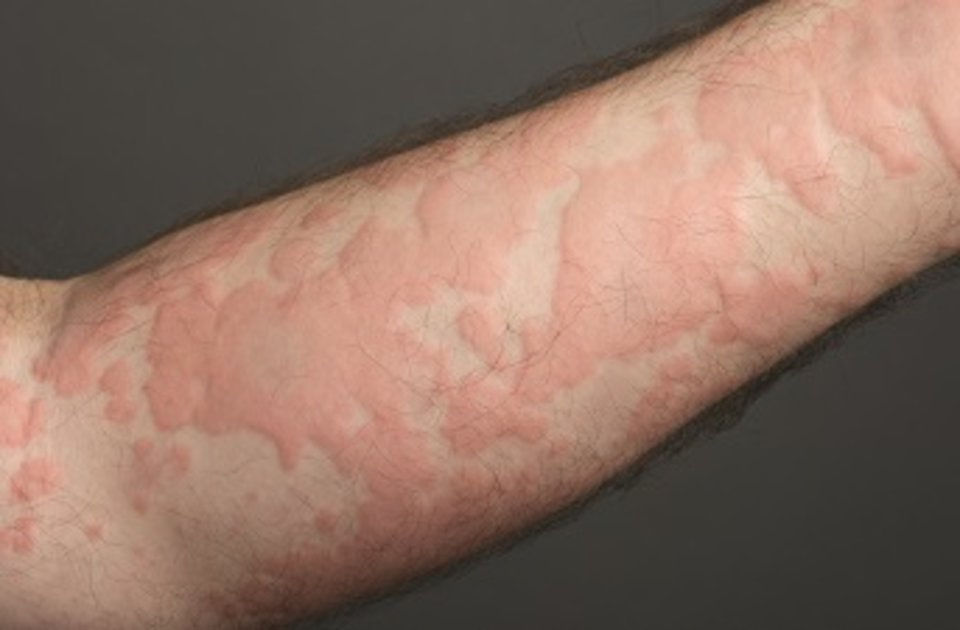Since 1928VHCA Hair Clinic World's 1st Ayurveda Hair Clinic
Urticaria
Urticaria, commonly known as hives, is a skin condition characterized by the sudden appearance of red, itchy welts or bumps on the skin. These welts can vary in size and may merge together to form larger patches. Urticaria can be acute, lasting less than six weeks, or chronic, persisting for six weeks or more. The condition is often triggered by an allergic reaction, stress, or other factors, and it can affect individuals of any age.

Causes of Urticaria
Allergic Reactions: Urticaria is frequently caused by an allergic reaction to certain foods (such as nuts, shellfish, or eggs), medications (like antibiotics or nonsteroidal anti-inflammatory drugs), insect bites, or latex. These allergens cause the body to release histamine and other chemicals, leading to the formation of hives.
Infections: Viral, bacterial, or fungal infections can trigger urticaria. Common examples include the flu, colds, and streptococcal infections.
Physical Stimuli:
Cold-Induced Urticaria: Exposure to cold temperatures, cold water, or even ice can trigger hives in some individuals.
Heat-Induced Urticaria: Exercise, hot showers, or exposure to warm environments can cause hives in susceptible individuals.
Pressure-Induced Urticaria: Prolonged pressure on the skin from tight clothing, belts, or sitting can lead to the development of hives.
Stress: Emotional stress or anxiety can trigger or exacerbate urticaria in some people. Stress-induced urticaria is often associated with chronic conditions.
Autoimmune Disorders: In some cases, urticaria is linked to autoimmune conditions, where the body's immune system mistakenly attacks healthy cells.
Unknown Factors: In many cases, the exact cause of chronic urticaria remains unknown. This is known as idiopathic urticaria.
Symptoms of Urticaria
The symptoms of urticaria can vary in severity and duration, and they may include:
Itchy Red Welts: The most common symptom of urticaria is the sudden appearance of red or skin-colored welts on the skin. These welts are often itchy and can be round, oval, or irregular in shape.
Swelling: The affected areas of the skin may become swollen and puffy. Swelling can also occur around the eyes, lips, and throat, a condition known as angioedema, which can be life-threatening if it obstructs the airway.
Rapid Onset: Urticaria often develops rapidly, with welts appearing and disappearing within a few hours. However, new welts may continue to form as old ones fade.
Varying Sizes: The size of the welts can range from small, pinpoint spots to large patches that cover a significant portion of the skin.
Worsening with Triggers: Symptoms may worsen with exposure to certain triggers, such as heat, stress, or allergens.
Ayurveda Perspective on Urticaria
In Ayurveda, urticaria is referred to as "Sheetapitta," which is believed to arise from an imbalance of the Vata and Kapha doshas, along with the aggravation of Pitta dosha. The condition is thought to result from the body's reaction to external allergens or internal toxins, leading to the manifestation of hives. Ayurveda focuses on detoxifying the body, balancing the doshas, and strengthening the immune system to provide lasting relief from urticaria.
Ayurvedic Treatment for Urticaria
Herbal Remedies:
Haridra (Turmeric): Turmeric has anti-inflammatory and antihistamine properties that help reduce itching and swelling associated with urticaria.
Neem (Azadirachta indica): Neem is known for its detoxifying and immune-boosting properties, making it effective in managing urticaria.
Guduchi (Tinospora cordifolia): Guduchi helps boost the immune system and detoxify the body, aiding in the treatment of chronic urticaria.
Dietary Adjustments:
Cooling Foods: Incorporate cooling foods such as cucumber, coconut water, and leafy greens to pacify Pitta and reduce inflammation.
Avoid Spicy and Sour Foods: These can aggravate Pitta and worsen urticaria symptoms.
Hydration: Drinking plenty of water helps flush out toxins and maintain skin hydration.
Lifestyle Modifications:
Stress Management: Practice stress-reducing techniques such as yoga, meditation, and deep breathing exercises to help manage stress-induced urticaria.
Avoid Triggers: Identify and avoid known triggers such as certain foods, medications, or environmental factors.
Gentle Skincare: Use mild, natural skincare products to avoid irritating the skin.
External Treatments:
Ayurvedic Medicines: After a lot of research VHCA brings ayurvedic medicines to treat Urticaria.
Ayurvedic Oils: Applying medicated oils like coconut oil or sandalwood oil can help calm irritated skin and provide relief from itching.
Why Choose VHCA Ayurveda Hair Clinic for Urticaria Treatment?
At VHCA Ayurveda Hair Clinic, we provide a holistic approach to treating urticaria by addressing the root cause of the condition. Our experienced practitioners offer personalized treatment plans that include herbal remedies, dietary advice, lifestyle modifications, and external treatments tailored to your specific needs.
Our goal is to provide long-lasting relief from urticaria by balancing the doshas, detoxifying the body, and supporting the immune system. With VHCA Ayurveda Hair Clinic, you can expect natural, effective, and safe solutions for managing urticaria and improving your overall well-being.
Connect for wellness: Begin Your Journey Today
